The Austrian school is a heterodox school of economic thought that advocates strict adherence to methodological individualism, the concept that social phenomena result primarily from the motivations and actions of individuals along with their self interest. Austrian-school theorists hold that economic theory should be exclusively derived from basic principles of human action.

Murray Newton Rothbard was an American economist of the Austrian School, economic historian, political theorist, and activist. Rothbard was a central figure in the 20th-century American libertarian movement, particularly its right-wing strands, and was a founder and leading theoretician of anarcho-capitalism. He wrote over twenty books on political theory, history, economics, and other subjects.

Squatting is the action of occupying an abandoned or unoccupied area of land or a building, usually residential, that the squatter does not own, rent or otherwise have lawful permission to use. The United Nations estimated in 2003 that there were one billion slum residents and squatters globally. Squatting occurs worldwide and tends to occur when people find empty buildings or land to occupy for housing. It has a long history, broken down by country below.

An informal economy is the part of any economy that is neither taxed nor monitored by any form of government. Although the informal sector makes up a significant portion of the economies in developing countries, it is sometimes stigmatized as troublesome and unmanageable. However, the informal sector provides critical economic opportunities for the poor and has been expanding rapidly since the 1960s. Integrating the informal economy into the formal sector is an important policy challenge.
Neoliberalism, also neo-liberalism, is both a political philosophy and a term used to signify the late-20th-century political reappearance of 19th-century ideas associated with free-market capitalism. The term has multiple, competing definitions, and is often used pejoratively. In scholarly use, the term is frequently undefined or used to characterize a vast variety of phenomena, but is primarily used to describe the transformation of society due to market-based reforms.

A slum is a highly populated urban residential area consisting of densely packed housing units of weak build quality and often associated with poverty. The infrastructure in slums is often deteriorated or incomplete, and they are primarily inhabited by impoverished people. Although slums are usually located in urban areas, in some countries they can be located in suburban areas where housing quality is low and living conditions are poor. While slums differ in size and other characteristics, most lack reliable sanitation services, supply of clean water, reliable electricity, law enforcement, and other basic services. Slum residences vary from shanty houses to professionally built dwellings which, because of poor-quality construction or lack of basic maintenance, have deteriorated.

Jeremy Rifkin is an American economic and social theorist, writer, public speaker, political advisor, and activist. Rifkin is the author of 23 books about the influence of scientific and technological changes on the economy, the workforce, society, and the environment. His most recent books include The Age of Resilience (2022), The Green New Deal (2019), The Zero Marginal Cost Society (2014), The Third Industrial Revolution (2011), The Empathic Civilization (2010), and The European Dream (2004).

A shanty town, squatter area or squatter settlement is a settlement of improvised buildings known as shanties or shacks, typically made of materials such as mud and wood. A typical shanty town is squatted and in the beginning lacks adequate infrastructure, including proper sanitation, safe water supply, electricity and street drainage. Over time, shanty towns can develop their infrastructure and even change into middle class neighbourhoods. They can be small informal settlements or they can house millions of people.
Profiteering is a pejorative term for the act of making a profit by methods considered unethical.

Rocinha is a favela in Brazil, located in Rio de Janeiro's South Zone between the districts of São Conrado and Gávea. Rocinha is built on a steep hillside overlooking Rio de Janeiro, and is located about one kilometre from a nearby beach. Most of the favela is on a very steep hill, with many trees surrounding it. Around 200,000 people live in Rocinha, making it the most populous in Rio de Janeiro.
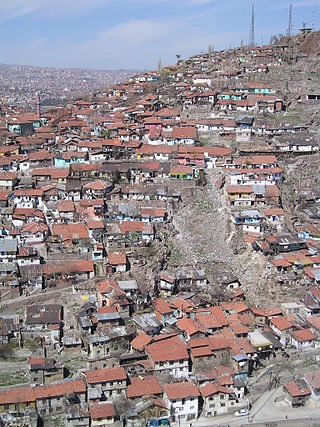
Gecekondu, meaning 'put up overnight', is a Turkish word meaning a house put up quickly without proper permissions, a squatter's house, and by extension, a shanty or shack. Gecekondu bölgesi is a neighborhood made of those gecekondular. Gecekondu neighborhoods offer an affordable alternative for shelter for many low-income households who can not afford to purchase or rent formal housing.
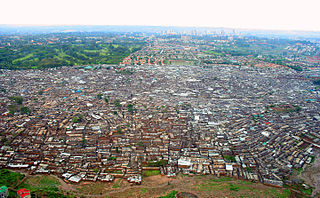
Kibera is a division and neighbourhood of Nairobi, Kenya, 6.6 kilometres (4.1 mi) from the city centre. Kibera is the largest slum in Nairobi, and the largest urban slum in Africa. The 2009 Kenya Population and Housing Census reports Kibera's population as 170,070, contrary to previous estimates of one or two million people. Other sources suggest the total Kibera population may be 500,000 to well over 1,000,000 depending on which slums are included in defining Kibera.

Ludwig Heinrich Edler von Mises was an Austrian–American Austrian School economist, historian, logician, and sociologist. Mises wrote and lectured extensively on the societal contributions of classical liberalism and the power of consumers. He is best known for his work in praxeology, particularly for studies comparing communism and capitalism, as well as for being an unyielding defender of classical liberalism in the face of rising illiberalism and authoritarianism throughout much of Europe during the 20th century.
System D is a manner of responding to challenges that require one to have the ability to think quickly, to adapt, and to improvise when getting a job done. The term gained wider popularity in the United States after appearing in the 2006 publication of Anthony Bourdain's The Nasty Bits. Bourdain references finding the term in Nicolas Freeling's memoir, The Kitchen, about Freeling's years as a Grand Hotel cook in France.
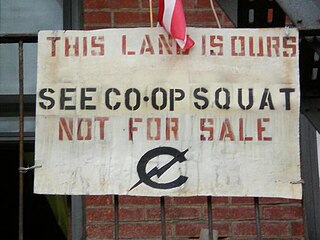
C-Squat is a former squat house located at 155 Avenue C in the Alphabet City neighborhood of Manhattan, New York City that has been home to musicians, artists, and activists, among others. After a fire, it was taken into city ownership in 1978 and squatters moved in 1989. The building was restored in 2002 and since then it has been legally owned by the occupants. Its ground-floor storefront now houses the Museum of Reclaimed Urban Space.

Gene Epstein is an American economist. He worked as the economics editor of Barron's Magazine from 1993 to 2018. He calls himself a follower of the Austrian school of economics and is an associated scholar at the Ludwig von Mises Institute in Auburn, Alabama.
The informal economy of the People's Republic of China refers to a range of informal economic activity that stands outside of the recognized systems of regulations, taxation, and licenses. Although the term is sometimes understood to describe marginal, unregulated, and even criminal activity, there is considerable overlap between the informal sector and formal economy, and the informal economy serves an important societal function in contributing to employment and economic growth.
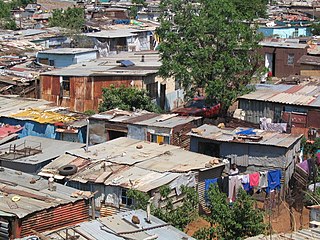
Informal housing or informal settlement can include any form of housing, shelter, or settlement which is illegal, falls outside of government control or regulation, or is not afforded protection by the state. As such, the informal housing industry is part of the informal sector.

Shadow Cities: A Billion Squatters, A New Urban World is a 2004 book by Robert Neuwirth. He wrote it after visiting informal settlements such as Dharavi, Kibera and Rocinha.
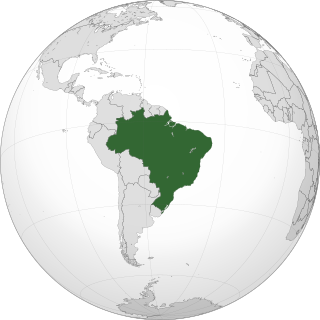
Squatting in Brazil is the occupation of unused or derelict buildings or land without the permission of the owner. After attempting to eradicate slums in the 1960s and 1970s, local governments transitioned to a policy of toleration. Cities such as Recife, Rio de Janeiro and São Paulo have large informal settlements known as favelas. A more recent phenomenon is the occupation of buildings in city centres by organised groups. In rural areas across the country, the Landless Workers' Movement (MST) arranges large land occupations.















